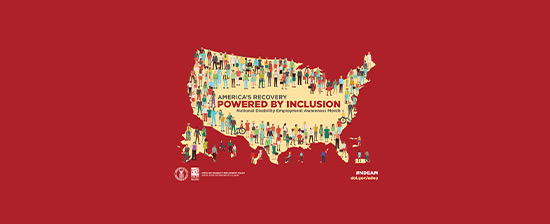This October marks the 76th anniversary of National Disability Employment Awareness Month. The purpose of the monthlong event is to raise awareness about disability employment issues and celebrate the many and varied contributions of America’s workers with disabilities.
Fittingly, the theme of this year’s National Disability Employment Awareness Month is America’s Recovery: Powered by Inclusion. Right now, a record number of businesses report having jobs they can’t fill. While safety concerns surrounding the global Covid-19 pandemic are very real, perhaps it is time for organizations to look at becoming more disability-inclusive in their hiring practices.
The Kansas Employment First Initiative Act was passed in 2011 declaring it to be the policy of the State that competitive and integrated employment shall be considered its first option when serving persons with disabilities who are of working age to obtain employment. Among other things, this act also established the Kansas Employment First Oversight Committee, whose focus is on increasing the number of Kansans with disabilities in competitive, integrated employment. What is competitive, integrated employment? Simply put, competitive and integrated employment means a job in the community that pays a worker with disability the same wage that a worker without a disability receives, and in which a worker with a disability interacts with workers without a disability.
Right now, our country is facing a shortage of school cafeteria workers, restaurant staff, hospitality and hotel staff, supermarket workers, textile workers and software engineers, among many other open employment opportunities. A research study produced jointly by AAPD and Disability:IN suggests that “if companies embrace disability inclusion, they will gain access to a new talent pool of more than 10.7 million people (in the U.S.).” So what’s the hold up?
Businesses don’t always understand the benefits of inclusive hiring practices. The study noted above revealed that companies that embrace best practices for employing and supporting people with disabilities in their workforces consistently outperform their peers, including having, on average, 28 percent higher revenue, double the net income and 30 percent higher economic profit margins. In addition, statistics show that employees with disabilities stay at jobs longer, thus reducing the time and cost involved in retraining and replacing personnel. Other national studies have shown that the performance of employees with disabilities equals or exceeds their non-disabled peers in several crucial areas, including safety, reliability and productivity. The intrinsic benefits that a disability-inclusive workplace provides include diversification and strengthening of culture through varied perspectives on how to confront challenges and get the job done. Individuals with disabilities bring creativity, innovation, problem-solving and commitment to the workplace.
Businesses are concerned about the cost of accommodating persons with disabilities. However, the data collected by the national Job Accommodation Network shows that most employers report no additional cost or low costs for accommodating employees with disabilities. “Of those accommodations that did have a one-time cost, the median one-time expenditure as reported by the employer was $500. When asked how much they paid for an accommodation beyond what they would have paid for an employee without a disability who was in the same position, the median answer given by employers was $20.”
What can we do to support disability inclusive hiring practices?
Individuals are encouraged to take the following actions:
- Share a NDEAM poster on social media. Download an English version or a Spanish version now.
- Share your inclusive workplace experiences with the hashtag #NDEAM on social media.
- Share these PSAs from the “What Can YOU Do?” Campaign
Employers are encouraged to:
- Display a NDEAM poster in our workplace. Download an English version or a Spanish version now.
- Use this month to educate and train employees and supervisors about inclusivity in the workplace. Start by accessing training materials from the Job Accommodation Network.
- Establish an Employee Resource Group.
- Participate in a Disability Mentoring Day.
- Reach out to the Kansas Vocational Rehabilitation Office to connect your business with skilled workers in your area! Learn more.
Please visit the U.S. Department of Labor website for more information about NDEAM. We can’t wait to see your celebrations and stories throughout October and beyond!


